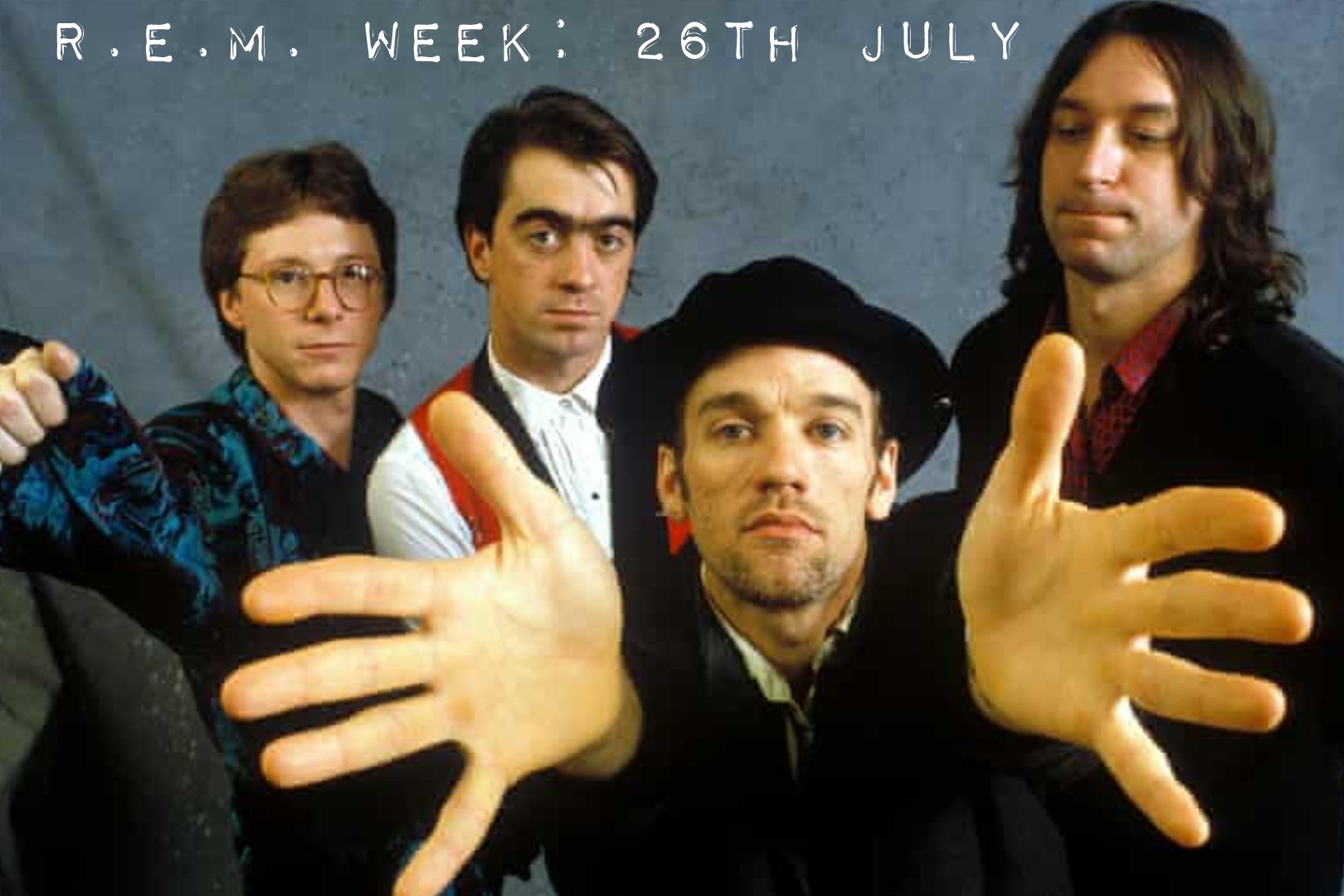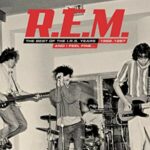When assembling a crack team of R.E.M.’s eleven most splendid songs, you can’t help but be struck by the number of contenders. For that reason alone, you’ll see an additional list of those who didn’t make the starting XI, but who would make up the remainder of a squad of twenty-three if R.E.M. songs were to head to a big tournament. They’d be hard to beat.
Listening to the entire recorded output of R.E.M. to conduct the selection process turned out to be a genuine labour of love. It took me away from the comfort of familiar favourites and into long-forgotten albums, even one or two that I realised that I had never listened to.
Every moment of every album sent me to the same thought I’d had when watching the 1999 Glastonbury set on the BBC back in June. The endless, timeless ‘mañana’ mindset of youth lied to me. It told me that I could wait pretty much forever to see R.E.M. and they’d eventually play a gig somewhere very convenient, at a bargain price that my meagre bank balance and inherent frugality could well tolerate.
To be fair, by the time I was genuinely old enough to go to gigs, or cool enough to let go of my obsession with Musical Youth’s first album, I was already past the point where Document and Green had come out. Much of my initial discovery of R.E.M. was a glorious retrospective delve into a substantial existing body of work. Anyone who does the same now will have 32 years worth of delights. If that’s you, definitely go back to the start and work your way through chronologically.
Major cultural learnings from this process for me? I’d massively overlooked Chronic Town as a starting point. I had also blithely and unfairly painted the last three albums beige, thinking of them as the perfectly acceptable output of a band who don’t seem able to release a bad song (although I still struggle with parts of ‘Radio Song’). But nowt special. How wrong I was.
After the rigours of this selection process, Accelerate and Collapse Into Now have particularly impressed and persuaded me that they are two of the most consistent albums for their stamina – the upkeep of sheer ‘all killer’ quality. And although Automatic For The People, Life’s Rich Pageant and Document provide seven of the starting eleven, there’s a fair spread of representation throughout the twenty-three, with only Monster, Up and Reveal not represented at all.
The starting eleven songs appear in numerical order, as any team should – the earliest year of release first. Home kit is definitely that pastel blue that Michael Stipe frequently wore across his eyes. Away kit might just have to be some kind of crushed orange:
R.E.M. Starting XI:
‘Wolves, Lower’ (Chronic Town EP) – 1982
The opener on the Chronic Town EP, ‘Wolves Lower’ immediately gives us the winning Stipe/Mills vocal combination that has gilded so many R.E.M. songs, alternating through the verses and together on the chorus. Post-punk spikiness makes the track feel suitably unrefined and edgy, considering the threat implied in the lyrics. Much has been hypothesised about the lyrics and the relevance of ‘suspicion’ and ‘not getting caught/hiding away in the shades’. Michael Stipe said that the lyrics on the first two releases were largely random. But then if you’re avoiding suspicion in the shades, you would say that…
Considering that R.E.M. stands for ‘Rapid Eye Movement’, this early example of the band is ‘Particularly Rapid Rapid Eye Movement.’ Apparently, the original recording was even quicker and they slowed it down deliberately for the final take. Everything stops at the end with an abrupt EMinor chord.
‘Radio Free Europe’ (Murmur) – 1983
Originally recorded before Chronic Town, but rerecorded for Murmur, this feels as unfettered as the previous track, yet it sounds more polished. As an opener on a band’s first full album, it’s a fair old statement of intent. A great advert for the band’s unapologetic idiosyncrasy, it’s cerebral and nonsensical in equal measures. Not many bands, apart from the likes of the Manic Street Preachers or more recently Public Service Broadcasting, would search for popular music topic matter in something like The Cold War – Radio Free Europe being broadcast into Eastern Bloc countries whom America considered not to have a free flow of reliable information.
“Decide yourself if radio’s gonna stay/ Reason: it could polish up the grey,” does make sense if you work it over enough times for meaning. Michael Stipe described it as “Complete babbling” though, as he describes much of the earliest songwriting: streams of eloquent, image-rich consciousness. Indie alt-rock can’t have much older genealogy than Murmur. ‘Radio Free Europe’ brought US college radio epiphanies galore. Murmur beat Thriller for album of the year in Rolling Stone magazine in 1983. For the record, it’s still miles better.
‘So. Central Rain’ (Reckoning) – 1984
Peter Buck’s Rickenbacker jangle at the start is of ‘So. Central Rain’ is a beautiful chime, but a misleadingly chipper start. As with the previous track, Mike Mills’ bassline is a stand-out feature and he further establishes his credentials as the best backing vocalist out there with his harmonies. While we’re talking vocal lines, check out the video, filmed at Reflection Studio (Charlotte, NC). Everyone else did the usual mime/sync of their parts, but Michael Stipe, ever the artist and risk-taker, insisted on a live vocal.
Stipe sings barely comprehensible lyrics during the verses and then apologises for something very clearly in the chorus, but we don’t know what. If you manage to discern his claim that “the conversation’s dimmed,” you can’t help but think, ‘You’re not wrong there, mate.’ All we’re fully aware of is the impained contrition of the repeated “I’m sorry.” It’s a Kurt Cobain kind of chorus, and one of many R.E.M./Nirvana points of comparison. Once you begin to spot them, you tend not to stop.
‘Cuyahoga’ (Life’s Rich Pageant) – 1986
Into a 1986 UK summer market where ‘We Don’t Have To Take Our Clothes Off’ by Jermaine Stewart and ‘So Macho’ by Sinitta were flying high, R.E.M. gave us ‘Cuyahoga’. Rather than partying or musculature, they gave us Native American history and the displacement of indigenous people. There’s also environmental ruination, specifically of a river that had to be set alight frequently in the 20th Century to incinerate its pollutants.
By this stage in R.E.M.’s evolution, the word association mumblecore lyrics have given way to the prosaic, colloquial beauty that characterises the majority of their work. The verses have a brooding beauty and then the chorus serves as a rousing call to arms. Simply bellowing “Cuyahoga” seems, simultaneously, to celebrate, mourn and reawaken the river’s essence and that of the people who lived around it. It’s as much a retrospective yearning for heritage, childhood, memory and nature as it is a desire to focus upon the now and “put our heads together and start a new country up,” as if the Reagan era was as bad as it was going to get…
‘Fall On Me’ (Life’s Rich Pageant) – 1986
Putting ‘Fall On Me’ next to ‘Cuyahoga’ on the same album makes for one of the finest-quality pairings in R.E.M. tracklisting history. It’s another one to start with bright guitar picking, before Bill Berry’s drumbeat is like a door slamming on brightness and it all goes ominous, like some uninvited hard-case turning up at your house party.
Bleakness can be beautiful. Although the song is about oppression, with a similar streak of environmental protest to ‘Cuyahoga’, (“Buy the sky and sell the sky”), they hit peak R.E.M. harmony levels, with layers of Berry, Mills and Stipe. And even though Mike Mills is basically singing, “It’s over” over and over, there’s so much going on that it’s pleasantly overwhelming. Overuse of over? Get over it. Over and out.
‘Finest Worksong’ (Document) – 1987
Everything is so powerful on ‘Finest Worksong’. When you listen to it closely, it’s a slow grunge song, before grunge was a thing, with a final section that could be a Smiths outro. And it’s yet another high-performing album opener in the starting XI. Everyone tries to start an album with an impressive first track, but enough albums flatter to deceive early on and peter out later. R.E.M. don’t do that. Document certainly doesn’t do that.
The steady battery of Bill Berry drums stays with you throughout the song. Sometimes, it’s what you hear most. We’re given a call to arms: “Take your instinct by the reins” and “Throw Thoreau and rearrange” – harness your gut feelings and shake things up, don’t disengage. As an anti-government message, it remains suitably obvious and hard-hitting, yet never so ponderous that it gets in the way of a damn good pop song.
‘It’s The End Of The World As We Know It (And I Feel Fine)’ (Document) – 1987
Unlike their very early ‘there are lyrics… but we can’t discern them’ songs, on ‘It’s The End Of The World As We Know It (And I Feel Fine),’ we can make out the lyrics, but we can’t keep up. As soon as the militaristic reveille drums have finished and we’re into “That’s great – it starts with an earthquake, birds, snakes and aeroplanes,” we achieve immediate overload, like constantly changing TV channels but still trying to keep up with what’s on each one.
Try to sing along and not falter. Even with the words on the screen. You can only manage to keep up by a solid act of memory and a lot of practice. Even Michael Stipe had to admit to a crib sheet (“We had to get the words on a computer”) when they did their MTV Unplugged session in 1991. Only the chorus slows down for delivery of that all important message: that we’re all heading for ruin, but if we accept that we are, we can pick up the pieces once it happens. The video is one of their finest, with a boy picking through the remains of a tornado-ravaged house, deciding what matters to him, with which he can go on and start again.
‘The One I Love’ (Document) – 1987
The final selection from Document makes it purely on the strength of Michael Stipe howling “Fiiiiiiiiirrrre” on a regular basis. It has plenty more going for it than that, but that refrain should provide you with some major catharsis, either from listening or from shouting along. It has so many classic R.E.M. facets: astute lyrics; the counterpoint between the Stipe/Mills vocals; multiple Buck hooks; a Berry drum intro and a simple yet painfully emotive chorus.
There’s a clever sense of a radio dedication going out to the loved one as the central idea – the easy, superficial, tokenistic offering of ‘love’ using a few words and piggybacking someone else’s creativity and notoriety. What follows, the reality that the person in question is ‘A simple prop to occupy my time’ reveals this as a song about antipathy and about users. If you’ve ever mistakenly played it as a genuine tribute to your nearest and dearest, get grovelling. I’m reliably informed that you can order flowers online 24/7 nowadays.
‘Orange Crush’ (Green) – 1988
R.E.M. made their Top of the Pops debut with ‘Orange Crush’. In terms of intelligent subject matter for a song, a rarity on such a show, Paul Hardcastle may have stolen their thunder with ‘Nineteen’, but this song is perhaps the one you could dance to the most straightforwardly from the starting XI. There’s a familiar Billy Berry drum beginning, yet the start sounds like we’ve been thrown into a song whilst it’s in progress – no slow starts, no easing us in.
In a similar sense to ‘Finest Worksong’, there’s a restless energy and a savage undercurrent to the lyrics. Think of the bitter irony in the wordplay of, “I’ve got my spine, I’ve got my orange crush,” reducing Agent Orange to the level of a cheap drink. Agent Orange was the defoliating chemical that was dumped on Vietnam to strip away tree cover, causing such widespread health problems in later years for US soldiers and those they were seeking to liberate. “We are agents of the free,” raises the irony and the sympathy a few more notches. The sustained simplicity of the chorus of “Oh” provides wistful and pained harmonies. As it begins, so it ends, stopped dead by a brief machine gun blast on the drums.
‘Find The River’ (Automatic For The People) – 1992
And now a contender for best closing track, certainly within R.E.M.’s work, but also among all known albums. Considering how frequently Automatic For The People touches upon mortality and the passing of time, ‘Find The River’ sends us away with a ‘no fear’ approach. The gentle acoustic guitar and mellotron, followed by “Hey now, little sleepy head” are warm and embracing, like a child’s bedtime.
Rich with natural references beyond the obvious watery ones, it’s a sensory feast. But the main message, following on from ‘It’s the End of the World…’ is all about acceptance. “The ocean is the river’s goal, we need to leave, the water knows,” so we need to relax and float downstream, not fighting the flow. Any song that approaches aging as a theme is bound to leave you with a bit of a lump in your throat or with something in your eye, especially once Mike Mills’ piano line gets to you late on.
‘Nightswimming’ (Automatic For The People) – 1992
Did someone say “Mike Mills’ piano line?” If you’ve never watched the Later with Jools Holland footage of ‘Nightswimming’ from 2003 and seen how Michael Stipe looks at Mike Mills as he provides the bedrock of the song on the keys, then do so. There’s a smile that borders on a tear. It’s all our faces whilst listening to ‘Nightswimming’. In a similar vein to ‘Find The River’, and placed in that closing run of outstanding songs, it’s about growing up and looking back at what’s been and gone – life as a process of ‘casting off’. There’s a glorious nostalgia to the Huckleberry Finn joys of youthfulness and nature.
Much as the Jools Holland version strips the song down to the kind of nakedness with which you might go nightswimming, the original is emotionally and sonically beefed up by a string section. Arranged by Led Zeppelin’s John-Paul Jones, they not only begin the song with the sound you get before an orchestra rehearsal comes to attention, but they also provide swells of reminiscent emotions. ‘Nightswimming’ can sound full of instrumentation, yet also carry that beautiful emptiness of a clear, quiet night. Deborah Workman’s oboe solo at the end must surely be everyone’s favourite oboe solo in pop history.
Other Squad Members (subs bench):
‘Bad Day’ (Single – on In Time: The Best of REM 1988-2003)
‘Drive’ (Automatic For The People)
‘Driver 8’ (Fables of the Reconstruction)
‘Half A World Away’ (Out of Time)
‘I Wanted To Be Wrong’ (Around The Sun)
‘Losing My Religion’ (Out of Time)
‘Man on the Moon’ (Automatic For The People)
‘Man-Sized Wreath’ (Accelerate)
‘Moral Kiosk’ (Murmur)
‘New Test Leper’ (New Adventures In Hi-Fi)
‘Supernatural Superserious’ (Accelerate)
‘Walk It Back’ (Collapse Into Now)




